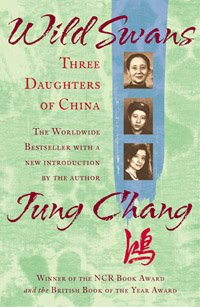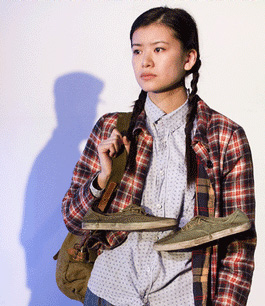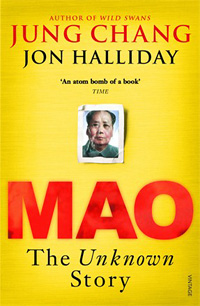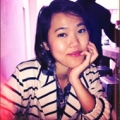You have no items in your cart. Want to get some nice things?
Go shopping Jung Chang’s epic family saga Wild Swans: Three Daughters of China turns 21 this year, and it is still in print, still being read. Here in London, where she now calls home with Jon Halliday, her husband and co-author of her second book Mao: The Unknown Story, her family’s history has been adapted for the stage at the Young Vic Theatre, starring Katie Leung (better known as Cho Chang in the Harry Potter films) as her younger self.
Jung Chang’s epic family saga Wild Swans: Three Daughters of China turns 21 this year, and it is still in print, still being read. Here in London, where she now calls home with Jon Halliday, her husband and co-author of her second book Mao: The Unknown Story, her family’s history has been adapted for the stage at the Young Vic Theatre, starring Katie Leung (better known as Cho Chang in the Harry Potter films) as her younger self.

In an interview with PEN at the London Book Fair on Monday, Chang said, “What I’m very pleased about is that 21 years on, Wild Swans stands on its feet. It has stood the test of time. After 21 years, nobody has said, ‘This is fake,’ or ‘That is wrong,’ so that’s something I’m extremely happy about.”
Both of Chang’s books are banned in China, but despite the official censors, her books are still being read in her native country.
“Thank god Hong Kong is still quite separate, and also Chinese tourists are now going to Taiwan. My books and other banned books and journals have helped the tourism industry in these places. Also, people have scanned my books onto the internet for other people to download, so I would say lots of people have read them. But of course the state censors are also busy deleting the internet versions, but you know, people keep putting them back on,” she explains.
Chang is also fortunate in that she is at least able to return to China to visit her mother even though her books are banned. She recalled that in the 1990s she had no problem going to China, but that “after the publication of Mao I did have problems, but the British government helped me.”
 She continued, “Also, Mao was more devastating than wild swans. Whilst [the Chinese government] were able to tolerate Wild Swans, they wouldn’t tolerate Mao. So Mao was banned very strictly and as a result, Wild Swans was also banned strictly.”
She continued, “Also, Mao was more devastating than wild swans. Whilst [the Chinese government] were able to tolerate Wild Swans, they wouldn’t tolerate Mao. So Mao was banned very strictly and as a result, Wild Swans was also banned strictly.”
So why is she allowed to return to China when other banned authors have been exiled and unable to return home?
“I would like to thank the readers of Wild Swans for enabling me to go back. […] I think I have been tolerated because I have to go back to see my mother, who is the main character of Wild Swans. The regime had to think that if they wouldn’t allow me to go back, a lot of readers would probably make some sort of stink. They didn’t want the bad press so they tolerated me.” Her brother, a journalist, is not allowed to go back to China and missed their mother’s 80th birthday last year because “he wrote some articles on the internet,” she said.
One might assume that Chang would have had other personal difficulties writing Wild Swans besides the problem of government censors. Countless authors have spoken about the difficulty of writing a family memoir, to be able to write with absolute honesty while having to consider the complicated feelings of family members, but Chang said that writing Wild Swans had in fact brought her family closer.
“My mother was somebody who really let go, in the sense that she encouraged me to write her stories but she never interfered and said I should portray her in a certain way and so on. She never tried to control me or to control her children. In fact, when she told me the stories in 1988, which was how I started to write Wild Swans, my mother would talk into a tape recorder when I was out working—I was teaching at SOAS at the time—and I realised my mother really wanted me to understand her. Also, she seemed to know that I’ve always wanted to be a writer, so she was helping me to fulfil my dreams, and she did this not by saying, you know, go and write this, but she did it by providing me with these sorts of materials, which awakened my desire to be a writer. I’ve always wanted to be a writer since I was a child but in China, it was impossible even to spell out my dream.
“In the Cultural Revolution books were burnt, writers were persecuted, I destroyed my first poem which I wrote on my 16th bday. But ever since then, when I was in China, when I was exiled to the edge of the Himalayas and worked in the fields, spreading manures in the fields… when I was an electrician and checked electric supplies on the pole, my mind would always be writing with an invisible pen, but I couldn’t put pen to paper. And my mother seemed to know I had harboured this dream, and she was going to help me fulfil this dream.
“In fact, when I finished Wild Swans, when I was beginning to worry about whether the book might do well, that people might not pay attention to it, my mother wrote to me and said, “You are not to worry. Because writing the book, she said, had brought me closer to her and she said that was enough for her, I had made her a happy woman. So my mother took away all my anxieties, and I didn’t have to agonize about how the book would be received. It’s all wonderful that the book became a success, but what I’m saying is that she has been tremendously supportive, my family has been tremendously supportive. They never told me what to say, what not to say, and you know, we have this trust among ourselves, which was why it made me particularly aggrieved and outraged when my brother was not allowed to go back to China for my mother’s 80th birthday.”
Not surprisingly, Chang was very opinionated in her assessment of Mao and the effect he’s had on China. At one point in the interview, after she pointed out that the great famine in China had been unnecessarily and wholly caused by Mao’s actions, she said, “I’m sorry, it just makes me very angry to think about today’s China. Now Mao’s portrait is till on Tiananmen Gate, his face is on every bank note. I hate to handle that Chinese money. It’s got so many people’s blood on it and. So when people ask me about the future of china, I would always say, watch that space on Tiananmen Gate, and watch that Chinese bank note. The day that Mao’s face disappears will be the day China would really become different, a sort of nice country to its people and a benign force for the world.”
Chang is currently working on her next book, also a biography, on the Empress Dowager of China Cixi (1835-1908), which will be published next year.
“In 1861 she launched a palace coup and seized power, and from that moment on she began to change China. It is she who brought China into the modern age from medieval society. And of course, she’s been maligned for over a hundred years. I mean, people give credit to Mao or to Sun Yat Sen or someone else but it was she. Anyway, it’s absolutely riveting. The communists tried to say they banned foot binding, like in my grandfather’s time. But in fact, it was the Empress Dowager who banned foot binding. I can tell you that under her, the freedom of press and the freedom of publication was greater than it is today.”
However, despite its relatively safe subject matter, Chang expects that this book will also be banned in China. “I hope not but I’m not very optimistic,” she said. “It’s also to do with me. The regime probably would not want my books to reach readers, so they will look out for other books.”
Wild Swans is on at the Young Vic until May 13. Book here.

About Emily Ding
Emily joined Litro in April 2012 as Literary Editor & Web Designer. She made over the website and introduced new developmental and editorial features to strengthen Litro's online presence. She left her position in January 2013, taking a backseat as Contributing Editor to concentrate on writing. She is a freelance journalist with a special interest in travel writing and foreign reporting (with an inclination for Asia and Latin America), and is now based in Malaysia. English is her native language, but she also speaks Mandarin and Spanish, having spent 2007-08 travelling in Central America.




